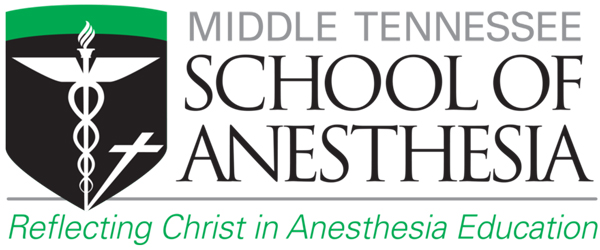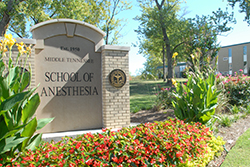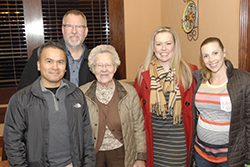Acute Surgical Pain Management Fellowship expands clinical sites, curriculum
August 25, 2021
Participants in MTSA’s Acute Surgical Pain Management (ASPM) Fellowship will soon have access to a new state-of-the-art clinical site in Mt. Shasta, Calif., focused on transitional pain services, according to Bill Johnson, CRNA, DNAP, Director, ASPM Fellowship and Doctorate Completion Program.
 MTSA graduate Jon Wilton (right) is director of anesthesia and chronic pain at Mercy Medical Center Mt. Shasta. His practice focuses on opioid-free interventions for chronic pain management. Wilton has joined MTSA in a special role as a clinical mentor and will help develop curriculum based on the growing area known as “transitional pain,” which includes a wide variety of preoperative interventions to minimize pain while a patient awaits surgery. It also includes caring for patients who transition to chronic pain.
MTSA graduate Jon Wilton (right) is director of anesthesia and chronic pain at Mercy Medical Center Mt. Shasta. His practice focuses on opioid-free interventions for chronic pain management. Wilton has joined MTSA in a special role as a clinical mentor and will help develop curriculum based on the growing area known as “transitional pain,” which includes a wide variety of preoperative interventions to minimize pain while a patient awaits surgery. It also includes caring for patients who transition to chronic pain.
“Jon operates one of the most cutting-edge anesthesia departments anywhere in the country,” Johnson said. “They’ve moved to a transitional pain service model where patients come in up to six weeks before their surgery, and they are able to provide long-acting regional blocks, which allow the patient to manage their pain without using narcotics. Then during surgery, they perform the conventional blocks that we teach in the Fellowship, followed by post-operative pain management.”
Johnson said that the Fellowship curriculum will begin to reflect the growing shift into transitional pain management, led by Wilton’s expertise. A few examples include preoperative cryoanalgesia for shoulders, knees, and intercostal nerves; pulsed or continuous radiofrequency neuromodulation for the shoulder, hip, and knees; and greater and third occipital nerve blocks and musculoskeletal injections, among other therapies.
“When we examine acute versus chronic pain, it’s really more of a continuum,” Wilton said. “There are plenty of patients, up to 85 percent depending on the procedure, who have surgery and end up with chronic pain. A transitional pain service helps remove the divide between chronic and acute. We’re identifying patients who are at risk before surgery and taking special precautions to make sure that their pain is treated adequately.”
According to Johnson, Wilton’s role as a clinical mentor for MTSA places him at the highest tier of knowledge and experience in nurse anesthesia, as evidenced by his use of innovative techniques and publishing original research articles. In addition, he has developed one of the largest online groups for ultrasound-guided regional anesthesia, with more than 6,000 global members sharing information and best practices.
“Because state regulations don’t allow the use of fluoroscopy, Jon employs an extremely innovative procedures for chronic pain management using ultrasound exclusively, which is practically unheard of. In addition, he has expanded the utilization of certain equipment which has pushed manufacturers such as Avanos and Iovera to recognize the application of their products in nurse anesthesia, adding CRNAs to their provider list. This includes both freezing and applying heat to nerves to prevent them from transmitting pain for a long period of time,” Johnson said.
According to Johnson, as the transitional pain curriculum is added to the Fellowship, the initial focus will be on long-term pain management for shoulder and knee patients, then expanded into other specialties.
“Jon’s involvement at MTSA will have huge benefits to our Fellows and, by extension, patient care in a variety of settings. It will boost the innovation and clinical experiences of our Fellows and provide exciting new opportunities for our profession,” Johnson added.
JOIN THE FELLOWSHIP
Now Enrolling
From medical management approaches, such as multimodal therapies and opioid sparing strategies, to advanced interventional techniques, including continuous catheter utilization, the ASPM Fellowship enables CRNAs to acquire the knowledge to treat patients with confidence and skill.
The Fellowship curriculum includes special focus on perioperative point-of-care ultrasound (PoCUS), which is the use of portable ultrasonography at a patient’s bedside for diagnostic and therapeutic purposes. Along with its use for pain management, heart, lung and abdominal ultrasound scanning may reveal sources of hypotension, hypoxemia and other presentations of cardiopulmonary instability.
In addition, fees for the basic and advanced Regional Cadaveric Workshops are waived during the Fellowship enrollment period for any applicants who have met all the admission requirements.
Application period closes Nov. 1. For more information about the ASPM Fellowship, visit www.mtsa.edu/fellowship.








